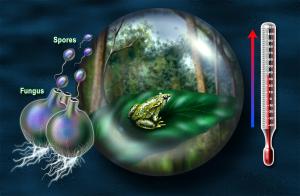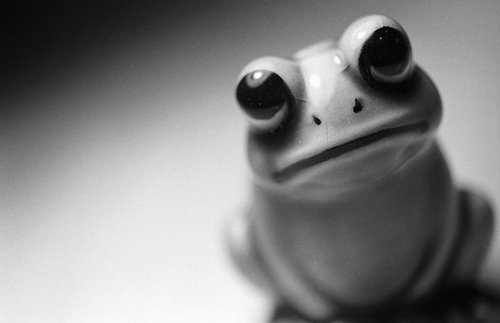While I’m no Crocodile Hunter or Jack Hannah, I have an interest in the variations of animals species and their development. When I was reading Dire Predictions by Mann and Kump, one of the subsections in the chapter caught my eye: The Highway To Extinction. Mann and Kump talk briefly about the effects of global warming on the animal kingdom and present a Biodiversity Impact Scale over the course of 100 years–concluding the obvious–as temperatures continue to rise, plant and animal species will die off.
Frustrating, to say the least. We continue to extract the resources from deforestation and lose some of the most beautiful and fascinating creatures. One such creature mention in the book, The Golden Toad, was last seen in Costa Rica in 1988. Studies, such as this one in the science journal Nature talk about the reasons why global warming affected the Golden Toad:
“Published in the Jan. 12 issue of the journal Nature, the study reveals how the warming may alter the dynamics of a skin fungus that is fatal to amphibians. The climate-driven fungal disease, the author’s say, has hundreds of species around the world teetering on the brink of extinction or has already pushed them into the abyss.”

The change in temperature and water levels are bringing about an increase in infectious diseases among species. According to a research study by PSU and OSU (additional reading here, the reasoning behind this is that the deeper water that the frogs are born in, the more likely they are to develop the fungal infection. In western frogs, the mortality rate was 100%.
So, not only are we eliminating our future in the process, we are killing off some famous frogs:
–Kermit The Frog
–The Budweiser Frogs
–Michigan J. Frog
Frogs are not the only ones being effected–as Munn describes it is making it harder for animals like the polar bear to find food due to the melting of the arctic ice cap.
At Copenhagen, let’s do something to get these animals off of the highway to extinction–or miss out on both their global, aesethic, ecological and educational impacts.

Tags: Biodiversity, Golden Frog